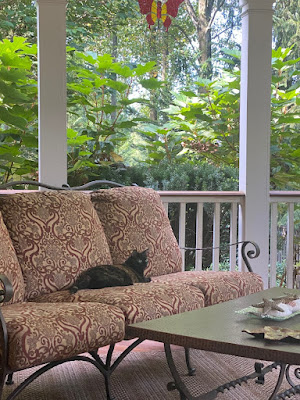Friday, October 8, 2021Tonight's picture was taken in October of 2008. Mattie was home from the hospital and his buddy, JJ, the Jack Russell Terrier came over to visit. You will notice that one of Mattie's friends gave him a stuffed animal that looked just like JJ. So Mattie was trying to show JJ the stuff animal to get his reaction!
Quote of the day: Today's coronavirus update from Johns Hopkins.
- Number of people diagnosed with the virus: 44,246,713
- Number of people who died from the virus: 712,171
It was another 6am morning! I can tell that I am one of the first people up on the block, given that the rest of the houses are dark at that hour. I get up so early because I have to factor in showering, dressing, walking Sunny, feeding both Indie and Sunny, and doing chores before beginning any work for the day. Given that Sunny is still recovering it takes much longer to get his new harness on and get him outside for a potty walk.
Given that it is Friday, that meant that it was Fosamax day. I honestly did not know what to expect this week given the nightmare I had last week. So far the only symptoms I am dealing with are intense exhaustion and abdominal pain. The exhaustion is so bad that I can't keep my head up and I have to lie down. Which is a rarity for me! This reaction happens about six hours after I take the pill. My hope is that symptoms normalize as my body gets used to taking this medication. Otherwise, I feel like I am losing one day a week of productivity.
One of the conference calls I had today was about providing psychosocial support to siblings of children with cancer. This is truly the forgotten group within a family system, and though non-profits do try to offer resources and support, the majority of the support is directed to younger children or those under 16 years of age. So what happens to the older teen and young adult sibling? Good question, it is an area ripe for research and the development of a framework for support. This issue was brought to my attention by two advocates. From my previous zoom call with them, I convened another zoom meeting today with the advocates and experts in the field.
It was through this dialogue today that I learned that there is solid research on this issue and age group coming from Australia. After I got off the call, I started doing some searches and came across a four day piloted program that combines psychosocial support/education with recreational activities. Which seems like a fantastic combination for teens and young adults, as bonding with fellow siblings while doing an activity seems much more natural and normal than a structured support group model. Honestly after experiencing a support group myself after Mattie died, I know first hand that this model doesn't work for most of us.
In any case, in the article, "The Development and Process Evaluation of PEER: A Camp-based Programme for Adolescents Impacted by Cancer," I learned about acceptance and commitment therapy, the proposed intervention used with adolescents in a camp setting. Frankly I never heard of acceptance and commitment therapy, so I had to look it up. Acceptance and commitment therapy (ACT) is an action-oriented approach to psychotherapy that stems from traditional behavior therapy and cognitive behavioral therapy. Clients learn to stop avoiding, denying, and struggling with their inner emotions and, instead, accept that these deeper feelings are appropriate responses to certain situations that should not prevent them from moving forward in their lives. With this understanding, clients begin to accept their issues and hardships and commit to making necessary changes in their behavior, regardless of what is going on in their lives, and how they feel about it.
What I like about this is it encourages people to embrace their thoughts and feelings rather than fighting or feeling guilty for having them. Which I think is very important when dealing with a childhood cancer diagnosis. Because it is very easy to blame one's self for not handling things well, for compounding the issues and making them worse, or to feel guilt about all the people and things that you have ignored (or let down) in order to manage the treatment and side effects.
It is intriguing to me as to why we don't address the needs of teen and young adult siblings in this country. When I ask non-profits who focus on sibling support as to why they don't include this age group, I get answers that range from 'they are a challenging age group to offer support' to 'liability and ethical concerns' for providing services. I don't doubt any of that, but what happens to these siblings in the mean time? For many siblings their needs and issues go unaddressed for years until either a crisis ensues or it becomes very challenging to function on a day to day basis. It's a sad commentary and it brings me back to the original problem. Our healthcare system is programmed to support only the patient and that is all insurance companies will reimburse for, and yet childhood cancer is a family disease, with long term side effects (both physically and psychologically) and if the family is floundering so is the patient!















